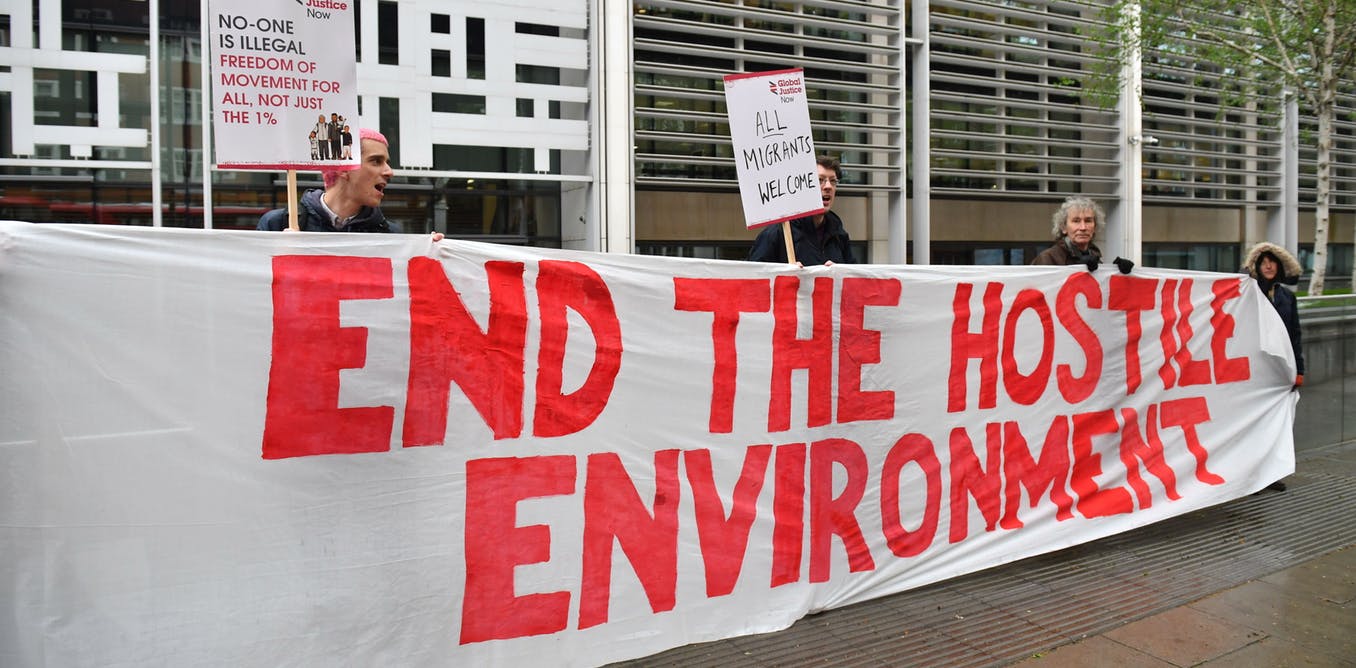
Dominic Lipinski/PA Archive
The article was originally published at The Conversation. By UDI Associate and
The British government’s “hostile environment” policy, which aimed at making life so difficult for irregular immigrants in the UK that they would leave, has been widely criticised in recent months, particularly after members of the Windrush generation were caught up in it. But our new research has found little evidence that internal immigration controls in the UK have brought down irregular migration. Instead, they have increased the suffering of migrants living on British soil.
Over the course of four years, we interviewed 175 irregular immigrants from Australia, Brazil, Pakistan, Turkey and Ukraine. By irregular immigrants we mean people who have no right, or who have revoked their right, to be in the UK and would be issued with a removal order if apprehended by the authorities. We also interviewed 29 immigration officers, staff from public services and voluntary sector organisations, as well as 18 employers.
Overall we found a mixed picture. About half of the irregular immigrants we interviewed didn’t worry about immigration controls or only worried at the beginning of their stay in the UK. One interviewee, a young woman from Ukraine, pointedly argued: “It is still better to be illegal in the UK than legal in my own country.” Several others made similar remarks.
But the other half of our respondents was rather anxious, and some had even developed psychosomatic stress symptoms such as sleeplessness. As a man from Ukraine told us: “Fear … you catch it from others like a virus.”
The much-criticised hostile environment policy, introduced by Theresa May in 2012 when she was home secretary, was rebranded as the “compliant environment” in spring 2018 in the wake of the Windrush scandal. But many of the checks it requires – be that by landlords or universities – remain in place.
It’s notoriously difficult to collect data on the number of irregular immigrants in any country. But they don’t seem to be leaving the UK in any significant numbers. Home Office figures indicate that arrests of irregular immigrants declined by 50% between the first three months of 2014 and the second three months of 2018, even as budgets for enforcement were cut. Meanwhile, estimates suggest that the number of irregular immigrants has actually been slightly increasing, at least until 2011, after which estimates aren’t available. Another study even found that strict government controls on immigration and visas actually drive up irregular migration as people turn to unauthorised channels to come to the UK.
Evasion strategies
Irregular immigrants develop various strategies to cope with the looming threat of detection. Some avoid certain industries and types of employers, such as kebab shops, because they felt these were specifically prone to raids. Others avoid locations and even whole cities such as London, or addresses where they had lived before which had been raided.
Instead, irregular immigrants are being pushed into other parts of the country, such as smaller towns. They are also finding work in private households, hidden from sight, such as renovation jobs, caring or cleaning and private tuition.
If they do have jobs in larger companies, they avoid morning shifts as they know that immigration raids are normally conducted around dawn. And they generally avoid any kind of crowd events. Some communities arrange WhatsApp groups and in some towns and neighbourhoods minicab drivers alert certain communities if immigration enforcement officers are in town.
Some of those we spoke to were less than impressed by immigration enforcement. As one Brazilian man put it: “The worst that can happen if they catch me is that they will send me back home, isn’t it?”
Of our 175 interviewees, only 29 encountered immigration enforcement during their stay in the UK. Of these 11 were detained, but only one was deported, and that person was back in the UK within a month and a half. And only one person we spoke to decided to leave the UK and go back to Pakistan because of unviable living conditions.
An ethnic pattern emerged from our interviews, with Pakistanis and Turks most likely to experience enforcement actions. It was also these communities who had higher levels of fear about encountering immigration officers. As one Australian woman put it:
I am pretty white. I get the impression that somebody that might be from the Middle East or sort of, that side of Asia, probably they get stopped more often.

Side effects
Our findings suggest immigration enforcement has a limited affect on bringing down the number of irregular immigrants currently living in the UK. But the hostile environment also has a range of unintended side effects.
A new market has grown up for the documentation that can be used to circumvent immigration controls. About a quarter of our interviewees said they had used false documents. This in turn has created networks which did not exist in the late 1990s and early 2000s, when one of us conducted a similar study.
All this means that the hostile environment is actually counterproductive: it has provided new opportunities for criminals, probably mostly people who are in the UK legally, to falsify documents.
Exploitation and suffering were also widespread among those we interviewed, though this was more prevalent in some communities such as Pakistani and Turkish communities, than in others. One Turkish woman told us that she slept in a small storage area for six months at her employers’ premises, adding: “It was horrible.”
Immigration enforcement within Britain is having an effect – but mostly not the ones officials intended. It doesn’t seem to reduce the number of irregular immigrants living in the UK but instead increases human suffering and crime. This raises some fundamental doubts about whether such policies are an appropriate measure for the UK to be using.


